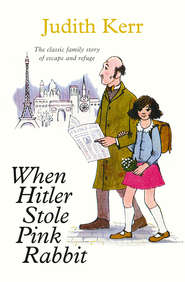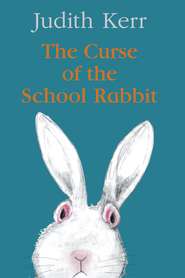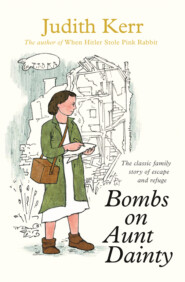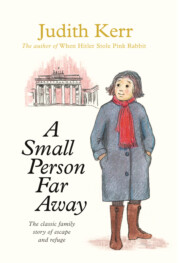По всем вопросам обращайтесь на: info@litportal.ru
(©) 2003-2024.
✖
Out of the Hitler Time trilogy: When Hitler Stole Pink Rabbit, Bombs on Aunt Dainty, A Small Person Far Away
Настройки чтения
Размер шрифта
Высота строк
Поля
Grete shook hands gloomily with Anna and Max.
“Can you speak quite a lot of French?” asked Max.
“No,” said Grete. “It’s a very difficult language. Some people never manage to learn it at all.” Then she turned to Mama. “Well, I think I’ll be off to bed.”
“But Grete …” said Mama.
“I promised my mother that no matter what happened, I’d always get my proper sleep,” said Grete. “I’ve turned off the gas under the potatoes. Goodnight all.” And she went.
“Really!” said Mama. “That girl is no use at all! Never mind, it’ll be nice to have our first meal in Paris together on our own. I’ll show you your room and then you can get settled in while I fry some more potatoes.”
Their room was painted a rather ugly yellow and there were yellow bedspreads on the two beds. A wooden wardrobe stood in the corner. There were yellow curtains, a yellow lampshade and two chairs – nothing else. There would have been no space for any more furniture anyway because, like the dining room, the room was quite small.
“What’s outside the window?” asked Max.
Anna looked. It was not a street, as she had expected, but an inner courtyard with walls and windows all round it. It was like a well. A clanging sound far below told her there must be dustbins at the bottom, but it was too far down for her to see. Above there were only the irregular outlines of rooftops and the sky. It was very different from the Gasthof Zwirn and from their house in Berlin.
They unpacked their pyjamas and toothbrushes and decided which yellow bed would belong to whom, and then they explored the rest of the flat. Next to their room was Papa’s room. It had a bed, a wardrobe, a chair and a table with Papa’s typewriter on it, and it overlooked the street. From Papa’s room a communicating door led to what looked like a little sitting room, but there were some of Mama’s clothes strewn about.
“Do you think this is Mama’s room?” asked Anna.
“It can’t be – there’s no bed,” said Max. There was only a sofa, a little table and two armchairs. Then Max took a closer look at the sofa.
“It’s one of those special ones,” he said. “Look” – and he lifted up the seat. In a cavity underneath were sheets, blankets and pillows. “Mama can sleep on it at night and then she can turn the room into a sitting room during the day.”
“It’s very clever,” said Anna. “It means you can use the room twice over.”
Certainly it was important to make the best possible use of the space in the flat, for there was so little of it. Even the balcony, which had sounded so grand when Papa had talked about it, was not much more than a ledge surrounded by wrought iron railings. Apart from the dining room which they had already seen there remained only the tiny room where Grete slept, an even tinier bathroom and a small square kitchen where they found Mama and Papa.
Mama, flushed and excited, was stirring something in a bowl. Papa was leaning against the window. He looked bothered and disapproving and as the children came in they heard him say, “Surely all this trouble can’t be necessary.”
The kitchen was full of smoke.
“Of course it’s necessary!” said Mama. “What are the children going to eat?”
“Cheese and a glass of wine,” said Papa, and the children burst into laughter while Mama cried, “Oh, you are hopelessly impractical!”
“I didn’t know you could cook,” said Anna. She had never before seen Mama in the kitchen.
“It’ll be ready in five minutes,” cried Mama, stirring excitedly. “Oh, my potatoes …!” They were going to burn again, but she just caught them in time. “I’m making fried potatoes and scrambled eggs – I thought you’d like that.”
“Lovely,” said Max.
“Now where’s the dish …and some salt …oh!” cried Mama, “I’ve got another lot of potatoes to do!” She looked appealingly at Papa. “Dearest, can you pass me the colander?”
“Which is the colander?” said Papa.
By the time the meal was ready on the table it was nearly an hour later and Anna felt so tired that she no longer cared whether she ate anything or not. But she did not like to say so as Mama had gone to so much trouble. She and Max ate their supper quickly and sleepily and then fell into bed.
Through the thin walls of the flat they could hear the murmur of voices and a clattering of dishes. Mama and Papa must be clearing the table.
“You know, it’s funny,” said Anna just before she went to sleep. “I remember when we lived in Berlin Heimpi used to make us fried potatoes with scrambled egg. She used to say it was quick and easy.”
“I expect Mama needs more practice,” said Max.
Chapter Thirteen (#ulink_c7a8302e-ac26-5361-a240-45acf33dde1d)
When Anna woke up in the morning it was bright daylight. Through a gap in the yellow curtains she could see a patch of windy sky above the rooftops. There was a smell of cooking and a clicking sound which she could not at first identify, until she realized that it was Papa typing in the room next door. Max’s bed was empty. He must have crept out while she was still asleep. She got up and wandered out into the hall without bothering to dress. Mama and Grete must have been busy, for all the luggage had been cleared away and through the open door she could see that Mama’s bed had been turned back into a sofa. Then Mama herself appeared from the dining room.
“There you are, my darling,” she said. “Come and have some breakfast, even though it’s nearly lunch-time.”
Max was already installed at the dining-room table, drinking milky coffee and pulling pieces off a long and incredibly thin loaf of bread.
“It’s called a baguette,” explained Mama, “that means a stick” – which was exactly what it looked like.
Anna tried some and found it delicious. The coffee was good too. There was a red oilcloth on the table which made the cups and plates look very pretty, and the room was warm in spite of the blustery November day outside.
“It’s nice here,” said Anna. “We wouldn’t have been able to have breakfast in our pyjamas at the Gasthof Zwirn.”
“It’s a bit small,” said Mama. “But we’ll manage.”
Max stretched himself and yawned. “It’s nice having our own place.”
There was something more that was nice. Anna could not at first think what it was. She looked at Mama pouring coffee and at Max tilting back his chair as he had been told a hundred times not to. Through the thin walls she could hear Papa’s typewriter. Then it came to her.
“I don’t really mind where we are,” she said – “as long as we’re all together.”
In the afternoon Papa took them out. They went on the Underground which was called the Metro and had a peculiar smell. Papa said it was a mixture of garlic and French cigarettes and Anna rather liked it. They saw the Eiffel Tower (but did not go up it because it would have cost too much) and the place where Napoleon was buried, and at last the Arc de Triomphe which was quite near home. By this time it was getting late, but Max noticed that you could go up to the top and that it was quite cheap, probably because it was not nearly as high as the Eiffel Tower – so they went.
No one else wanted to go to the top of the Arc de Triomphe on this cold, dark afternoon and the lift was empty. When Anna stepped out at the top she was met by an icy blast of wind and a prickle of raindrops and she wondered whether it had been a good idea to come. Then she looked down. It was as though she were standing at the centre of a huge sparkling star. Its rays stretched out in all directions and each one was a road lined with lights. When she looked closer she could see other lights which were cars and buses crawling along the roads, and immediately below they formed a bright ring circling the Arc de Triomphe itself. In the distance were the dim shapes of domes and spires and the twinkling spot which was the top of the Eiffel Tower.
“Isn’t it beautiful?” said Papa. “Isn’t this a beautiful city?”
Anna looked at Papa. His overcoat had lost a button and the wind was blowing through it, but Papa did not seem to notice.
“Beautiful,” said Anna.
It was nice to get back to the warm flat, and this time Grete had helped Mama with the supper and it was ready in good time.
“Have you learned any French yet?” asked Mama.
“Of course not,” said Grete before anyone else could answer. “It takes months.”
But Anna and Max found that they had picked up quite a few words just from listening to Papa and other people. They could say “oui” and “non” and “merci” and “au revoir” and “bonsoir, Madame”, and Max was particularly proud of “trois billets s’il vous plaît” which was what Papa had said when he bought tickets for the Metro.
“Well, you’ll know a lot more soon,” said Mama. “I’ve arranged for a lady to come and give you French lessons, and she’s starting tomorrow afternoon.”
The lady’s name was Mademoiselle Martel and the following morning Anna and Max tried to collect everything they would need for her lesson. Papa lent them an old French dictionary and Mama found them some paper to write on. The only thing neither of them had was a pencil.









